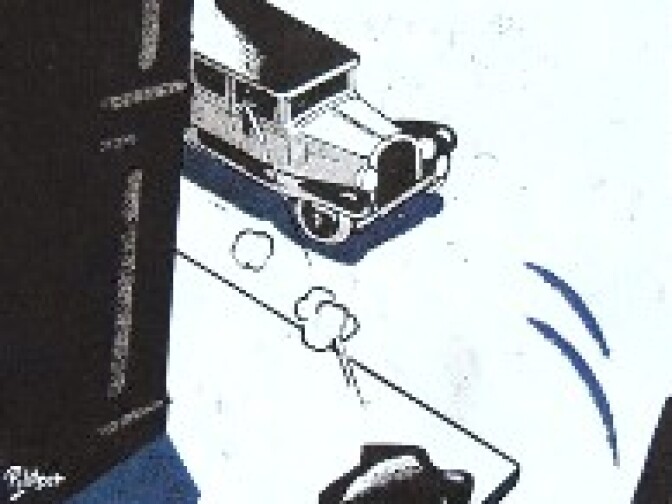Off-Ramp's Marc Haefele pays tribute to WR Burnett, who invented the "noir" genre with his book, "Little Caesar," told from the gangster's point of view. Burnett made millions and spent most of it at the track.
NOTE FROM JOHN: Here's the script of Marc's commentary:
HAEFELE BURNETT 062709
“I had five dollars to my name, a worn overcoat and a hand-me-down-suit that had seen better days, but I’d never been happier in my life.”
Rabe: Off-Ramp literary commentator Marc Haefele, on “the Man who Invented Noir,” William Riley Burnett.
80 years ago, deep in the slums of a Chicago – “Where Capone was King, corruption was rampant and Mayor Bill Thompson was trying to punch the King of England in the Snoot” -- after a six-year string of literary failures, 30 year-old Bill Burnett had just published the first modern crime novel. In a year that brought forth major fiction from authors like Fitzgerald and Faulkner, Burnett’s book, “Little Caesar,” was an instant best seller-- translated into 12 languages. “Including English,” one friend joked, in reference to its ungrammatical underworld dialogue.
Weeks later, Burnett took the train to L-A, where he wrote the screenplay for “Little Caesar,” the movie that made Edward G. Robinson a star as the ruthlessly homicidal young gangster Cesare “Rico” Bandello.
CLIP: “Little Caesar” (1931)/Edward G. Robinson: Yeah, money’s alright, but it ain’t everything. Ehhh, be somebody! Look hard at a bunch of guys and know that they’ll do anything you tell ‘em. Have your own way or nothin’. Be somebody!
Showing the Underworld from the gangster’s, rather than the cop’s, point of view, Burnett laid down the Laws of Noir. It was 1930, and soon Burnett’s screenwriting helped Hollywood mint tens of millions of dollars portraying -- some would say, glamorizing -- the Prohibition-inspired wave of organized crime that was wracking America.
Among the other noir classics Burnett penned as novels and screenplays were John Houston’s 1949 “Asphalt Jungle,” and Raoul Walsh’s 1941 “High Sierra,” with Humphrey Bogart in his first great gangster role.
CLIP: “High Sierra” (1941)/Humphrey Bogart: What’s the matter? Yellow? Come and get me, buddy, come and get me!
“I never considered myself a crime writer,” Burnett said. He saw crime as just another element of human society, like elected government, with which crime’s top figures worked hand in hand. Hence his power-figure characters like “The Big Boy” in “Little Caesar” and “Big Mac” in “High Sierra.” Who count their profits while their gangster pawns fight the law and die.
Over 53 years, Burnett worked with John Huston, John Ford, Howard Hawks, Nicholas Ray and Michael Cimino, Humphrey Bogart, Ida Lupino, Paul Muni, Frank Sinatra, Marilyn Monroe, Steve McQueen -- in the Great Escape -- and Clint Eastwood. He got two Oscar nominations. But he always called himself a novelist, even in the 1930s, when he made 35-hundred dollars a week screenwriting … back when 35-bucks a week was a very good wage. He said, “My problem was never making money; it was keeping it.” The ponies of Hollywood Park got most of the millions he earned, and the dog tracks took the rest. The lesser, but less profligate, writer, Sidney Sheldon, ended up in a landmark estate on Sunset Boulevard. But Burnett, along with Whitney, his fellow horseplayer and wife of 37 years, shared a modest Marina del Rey townhome before he died in 1982 … with 38 books and 60 screenplays to his credit.
Sadly, his books seem out of print in America and are scarce even in libraries. The LA city main library had the only on-loan copy of “Little Caesar” I could find in LA County. But movies he wrote look like they’re going to live forever. Unlike their protagonists …
CLIP: “Little Caesar” (1931)/Edward G. Robinson: Mother of Mercy, is this the end of Rico?
For Off-Ramp, this is Marc Haefele




